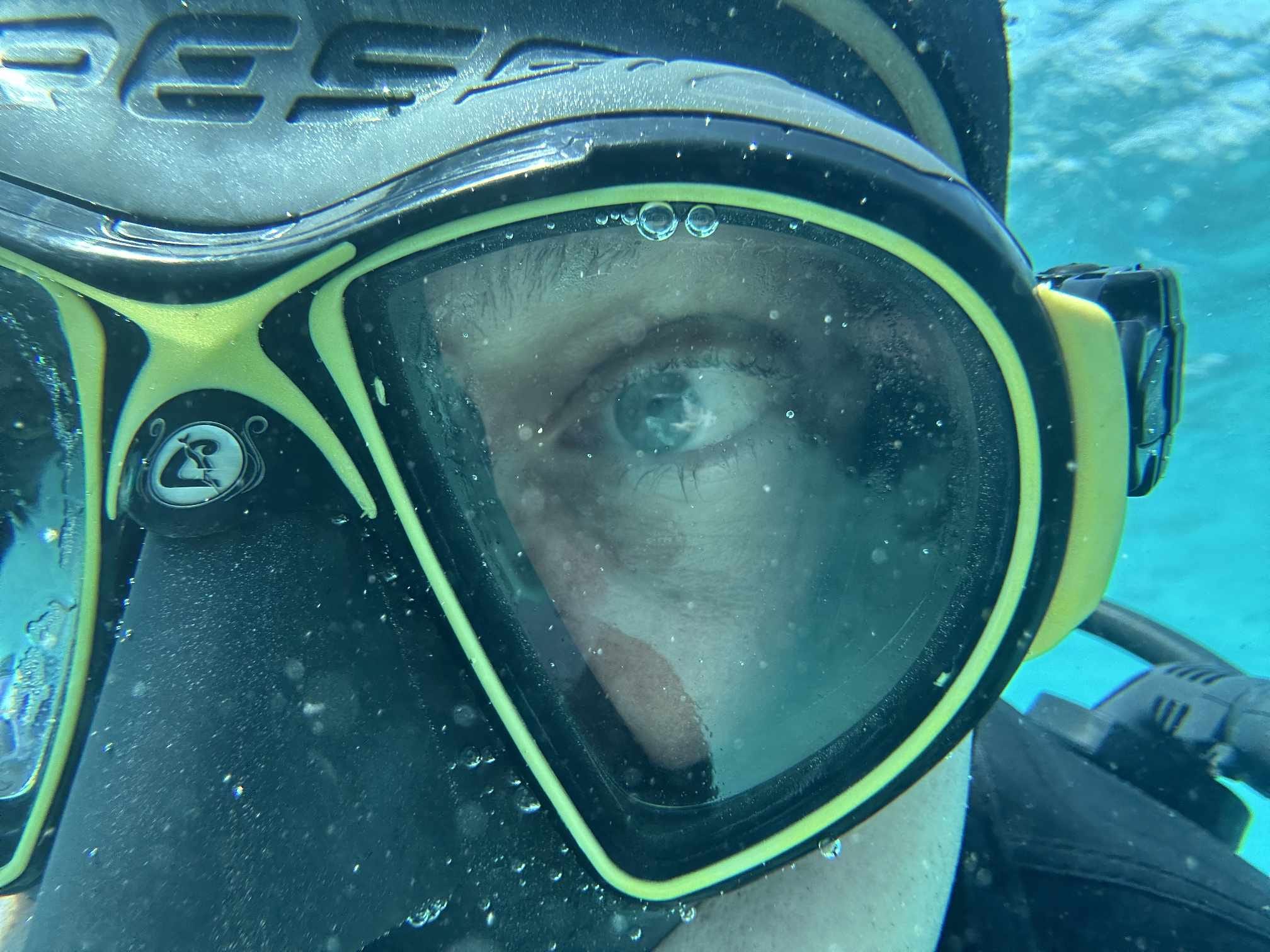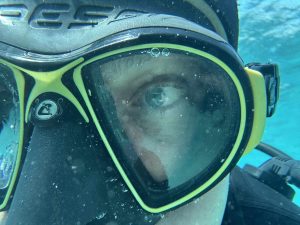One of the most frequent questions of the diving club "Diving“, a PADI Dive Instructor has “Can I wear lenses while diving?". The allure of the underwater world beckons adventurers, and for those with vision impairments, choosing between contact lenses and prescription masks becomes a major diving decision. Both options aim to provide clear vision beneath the waves, yet each has its own unique set of considerations. This article serves as a comprehensive study comparing the benefits, challenges, and practicalities of contact lens diving and prescription mask selection.
We'll explain both options above in more detail below, but you should know: water improves your vision. Due to refraction, underwater objects appear 33% larger and 25% closer. If (like several divers at Diving Club) you are a little nearsighted, you may not need corrective lenses while diving. Most people wear reading glasses that range from +0.75 to +2.50 diopters, but your reading glasses will definitely increase in power as you get older.
If you are looking for advice or help on prescription diving masks with diopters, which can be purchased in the "Divings" store, contact or call the instructor at t.220-77-202, to find the right help and practice safe scuba diving.
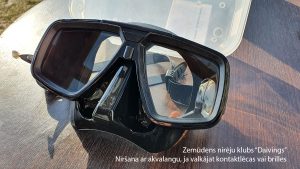
Table of Contents
What is it like to dive with contact lenses underwater?
Contact lenses have long been a popular choice for people who want to correct their vision without glasses. When it comes to scuba diving, the choice of contact lenses opens up a world of possibilities. Recommended by ophthalmologists and optometrists, soft contact lenses are the preferred option due to their flexibility and comfort. However, challenges arise as divers descend into the depths.
One significant concern is the potential for contact lenses to shift or dislodge during pressure changes, causing vision loss and discomfort. A buildup of inert gas between the cornea and lens can cause symptoms such as eye pain and blurred vision. To mitigate these challenges, divers should choose their lenses wisely by choosing soft lenses and ensuring a secure fit in the eye.
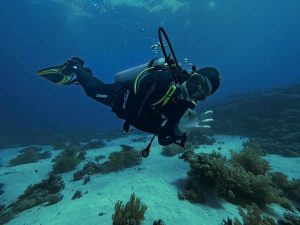
How to use prescription masks for divers?
Prescription masks offer a targeted solution for divers who choose to leave their contact lenses behind. These masks are customized according to the diver's instructions, providing unparalleled clarity below the surface of the water. Unlike contact lenses, prescription masks eliminate the concerns of lens displacement and potential gas bubbles between the lens and cornea.
One of the major advantages of prescription masks is their simplicity. Divers can put on a mask and be confident in the reliability of their vision without additional eye care considerations. However, prescription masks have their own considerations, such as proper fit, mask cleaning techniques, and potential for fogging.
Diving with contact lenses brings comfort and convenience
Comfort and convenience play a key role in determining the effectiveness of vision correction methods for scuba diving. Contact lenses offer the advantage of familiarity, as many individuals already use them in their daily lives. The lightweight nature of the contact lenses allows divers to move freely without the added weight and bulk of prescription masks.
Prescription masks, on the other hand, provide a seamless solution without requiring any additional steps or considerations before diving. The comfort of a well-fitted mask enhances the overall diving experience, allowing divers to focus on the fascinating underwater world rather than the nuances of lens care and maintenance. Ultimately, the choice between contact lenses and prescription masks comes down to individual preference and comfort priority while diving.
Prescription masks or contact lenses for divers, divers and freedivers
Each method of vision correction has a unique set of challenges once immersed. Contact lens wearers must contend with the possibility that the lenses may shift or dislodge during changes in pressure. Blinking frequently and ensuring a tight-fitting mask can help alleviate these concerns, but it's important to be proactive. Dry eyes, exacerbated by the underwater environment, can also be a problem for contact lens wearers, requiring the use of lubricating eye drops and saline solutions.
Prescription masks, while eliminating the concerns of lens shift, face issues such as mask fogging. Fog formation occurs when temperature differences between the inside and outside of the mask cause condensation. Anti-sweat solutions and proper pre-dive preparation can help alleviate this problem by ensuring uninterrupted visibility while diving.
Deciding to use contact lenses or a prescription mask for diving or snorkeling
The decision to use contact lenses or prescription masks for diving is a highly individual one, influenced by a variety of factors, from comfort preferences to practical considerations. Divers must weigh the benefits and challenges of each option against their needs and preferences.
For those who value contact lens awareness and are comfortable with contact lens wear, ensuring a proper fit and following recommended diving practices can ensure a seamless underwater experience. Soft lenses prescribed by eye care professionals remain the preferred choice, reducing the risk of discomfort and vision problems associated with changes in pressure.
Alternatively, divers looking for a no-fuss, low-maintenance solution may find prescription masks an ideal choice. The custom clarity offered by these masks eliminates concerns about lens drift and provides a reliable method of vision correction that requires no additional steps before or after the dive.
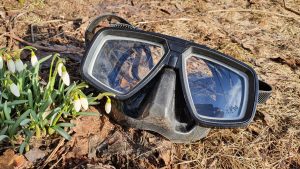
Conclusion on choosing between contact lenses and prescription masks
In diving, the choice between contact lenses and prescription masks comes down to nuanced personal preference, comfort, and the desire for uninterrupted vision beneath the waves. Contact lenses provide familiarity and ease of use, but they require careful care to prevent problems such as lens displacement and dry eyes. Prescription masks provide a customized solution, providing clarity without the need for additional eye care, but can run into issues such as fogging.
As technology advances, innovations in both contact lenses and prescription masks continue to improve the options available to underwater enthusiasts. Ultimately, the decision rests with the diver, who must prioritize comfort, convenience and the joy of exploring the enchanting depths with crystal clear vision.
Whichever option you choose, an optical mask or contact lenses
If your vision is severely impaired when you are not wearing contacts or goggles, always tell your instructor, diving colleague and / or diving guide. That way, if you lose your optical diving mask or your contact lenses fall out while diving, they can help. During the first lobe, before diving, decide on a "I can't see" signal and plan how you will work together to return to the water, boat, and so on.
Learn more about these diver training courses:
- EFR (Emergency First Response)
- PADI Adaptive Support Diver
- PADI Adaptive Techniques Specialist Diver
- Scuba diving if you wear contact lenses or goggles (script)
If you are looking for advice or help with prescription charges, which can be purchased in the "Divings" store, communicate and visit the diving club "Diving" or call the instructor at t.220-77-202, to find the right help and practice safe scuba diving.

